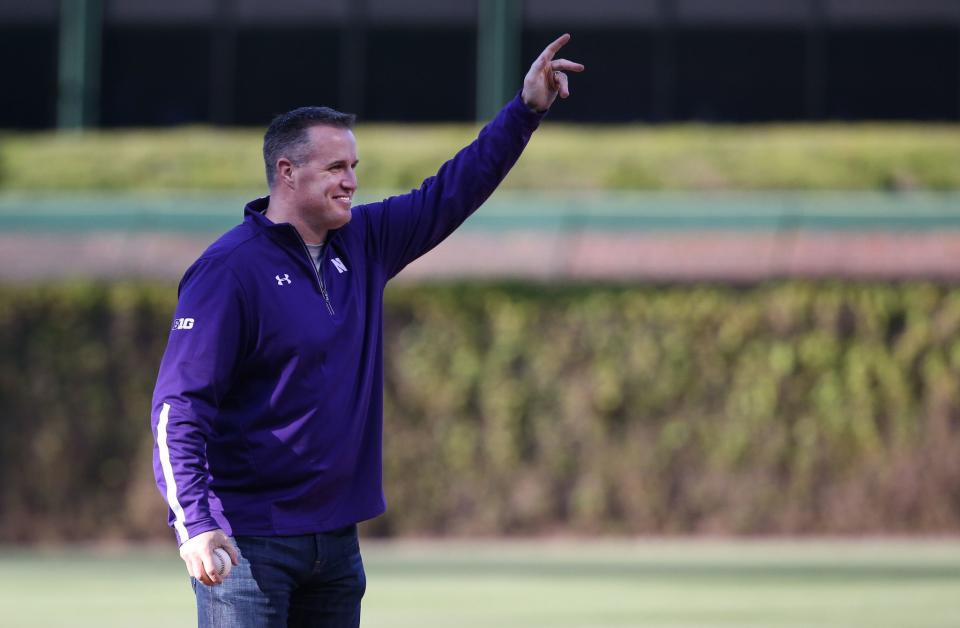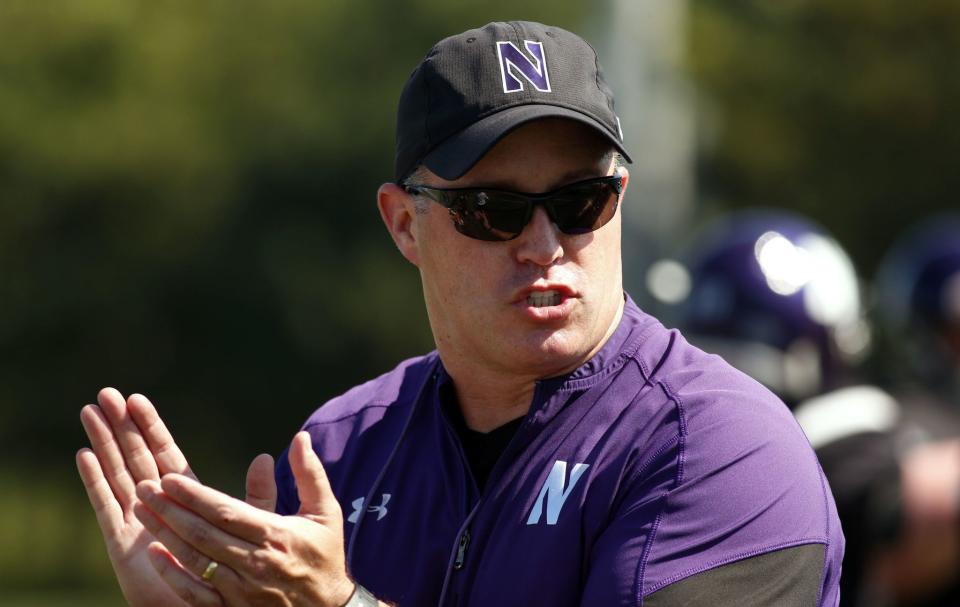‘Infuriating.’ Northwestern students, former players and Illinois leaders react to football program hazing reports.
- Oops!Something went wrong.Please try again later.
As a child, Ramon Diaz dreamed of studying at Northwestern University and playing football for the Big Ten school.
Yet he said the experience left him traumatized because of hazing, rampant racial slurs and a generally toxic culture, which he said endured from 2005 to 2009 as an offensive lineman.
“I think about it every day,” said Diaz, who was the first member of his Latino family to graduate college. “I’ve thought about it every day since I graduated.”
Reports of football player hazing have sent shock waves across Northwestern, resulting in the firing of head coach Pat Fitzgerald on Monday. Former players, students and Illinois lawmakers reacted to the troubling allegations, some offering potential solutions to combat hazing in the future.
Northwestern President Michael Schill said in a statement Monday that 11 current or former players had acknowledged that hazing “has been ongoing within the football program,” based on an independent investigation that was spurred by a former player’s allegations in late 2022; the full report, however, has not been released publicly.
The president’s statement said the hazing included “forced participation, nudity and sexualized acts of a degrading nature, which violated the school’s policies.
“In (news) media reporting today, still more former Northwestern football student-athletes confirmed that hazing was systemic dating back many years,” the statement added. “This has never been about one former student-athlete and his motives; this is much bigger than that.”
As for Diaz, he recounted an incident where another player once shaved the words “Cinco de Mayo” in his head. He recalled coming in off the field, muddy from playing football like the rest of the team, to be singled out by a coach and told, “I know that you grew up on dirt floors but here we have to keep things clean.”
“You don’t know the power dynamics until you’re in it,” he said. “I had everything to lose if I spoke out.”
Whenever he was asked by prospective students about Northwestern, he would urge them to look elsewhere, often giving vague reasons.
Diaz stressed that reform needs to happen on multiple levels, adding that Fitzgerald’s replacement should not be an internal hire.
“This is not a one-incident thing,” he said.
Braden Jones, who played football at Northwestern in 2002 and 2003, said news of the allegations was triggering. “I had a terrible experience there,” he said. “I don’t blame Coach Fitzgerald for that — he wasn’t the head coach at the time but was supportive of me.”
Jones said while some people are quick to call whistleblowers “liars,” those who have seen up-close the culture of hazing believe there is truth to the allegations. For instance, he detailed a hazing custom known 20 years ago as “the loofah line.” Jones said during preseason training camp in Kenosha, Wisconsin, the offensive linemen used to stand naked with soap all over, facing each other while the freshmen students were forced to walk through them. “The culture there is similar to the one we see in fraternities — it was hazing where it’s under the guise of team building or camaraderie,” he said. “At the end of the day, it’s harmful, it’s negative, and it has a lasting impact on people.”
In 2004, Jones, then 21, was arrested after an altercation at a football game. He said he’s always correlated his fallout and troubled past to his time as a student-athlete at Northwestern. “I do not like thinking about my experience at Northwestern. It’s bad memories,” he said. “A lot of drinking … the mental anxiety that I had and other players had regarding what was about to happen was pretty overwhelming to the point that I couldn’t eat, I felt sick to my stomach. Just some of the physical punishments that we endured were pretty barbaric and really counterproductive to being an effective football player.”
Jones left Northwestern in 2004 and transferred to Southern Illinois University before playing a full NFL season with the Minnesota Vikings.
Now an orthopedic surgeon based in Cortez, Colorado, Jones said it’s disappointing to see the kind of abuse he and his teammates faced more than two decades ago is still prevalent.
“When I went to Northwestern, I thought it was awful, I hated it and I wanted to quit. And then ultimately, I went to SIU and it was better and the culture was better, and there was no hazing outside of things like making the freshmen carry your pads during training camp,” Jones said.
Evanston resident Cathy Lu, who graduated from Northwestern in the spring, said the allegations of hazing were not at all surprising, adding that she’s found the school to generally be complacent when it comes to students’ concerns.
“We see again, (Northwestern) administration, failing to like, step up and like, do things about the well-being of students,” she said.
She called the hazing reports unsettling, especially since the behavior happened “just down the street,” she said.
Lu added that she agreed with calls for Fitzgerald to resign.
“The fact that is happening here at this renowned school with a renowned athletics department and (recreation) facilities and stuff is really big,” she said. “It’s kind of infuriating.”
Jason Li, a junior at Northwestern, said he doesn’t keep up with the football team but now sees hazing as something the whole campus community should be more aware of.
As someone holding leadership positions in various campus clubs, Li said he wants to make sure hazing, in any form, isn’t tolerated.
He added that he’s done online anti-hazing training, “but it didn’t really like occur to me that it’s happening.” Li said.
“This has definitely brought up my awareness,” he added.
Gov. J.B. Pritzker spoke vaguely on the hazing allegations against the Northwestern football program at an unrelated news conference on Monday, prior to news of Fitzgerald’s ouster.
“This is not something that should be taken lightly,” he said. “I know the Northwestern leadership has not taken it likely.”
Pritzker added that “we’ve got to hold people accountable who are in leadership in setting the tone for leadership,” though he said he didn’t know enough about the investigation to comment on specifics.
State Rep. Kam Buckner, a Democrat from Chicago, told the Politico Playbook that the hazing revelations prompted him to continue his existing work on creating a student athletes bill of rights.
“Hazing is already illegal in Illinois but I think there are some things we can codify to strengthen what we already have,” he said at the Monday news conference. According to Illinois state law, hazing is committed when someone “requires the performance of any act by a student or other person in a school … for the purpose of induction or admission into any group … connected with that institution.” Hazing in Illinois is treated as a Class A misdemeanor but becomes a Class 4 felony if it “results in death or great bodily harm.”
Buckner told the Tribune he is still looking at exactly what additions must be made to Illinois law to best protect student-athletes. But he spoke from personal experience to explain that students would benefit from knowing exactly where lines are drawn.
“I didn’t witness or go through any hazing at the University of Illinois as a football player but I don’t know that I knew that it was illegal when I was a 19-year-old sophomore in Champaign,” he said. “A lot of this may really just be about educating student-athletes on what their rights are in many ways. And it’s probably just a compilation of things that already exist.”
Buckner added that he’s also supportive of setting up an independent body that is not part of a specific school where players and can report hazing.
Northwestern has faced previous allegations of harassment and hazing, often resulting in leadership or systemwide shake-ups in the aftermath.
A Northwestern student cheerleader filed a federal lawsuit in late 2020 alleging she was repeatedly groped and harassed by drunken fans and alumni during university events, adding that older men would touch her breasts and buttocks over her uniform and pick her up without her consent. The lawsuit also claimed the head coach required cheerleaders to mingle with wealthy donors to help the school’s finances.
“(The) cheerleaders were being presented as sex objects to titillate the men that funded the majority of Northwestern’s athletics programs,” the lawsuit said. “After all, the happier these men were, the more money the university would receive from them.”
In the aftermath, multiple Black cheerleaders had also described experiencing racial discrimination, and former members said they weren’t permitted to wear their hair in braids, according to Daily Northwestern reports. Team contracts said that braids were explicitly banned from games in at least two seasons between 2017 and 2019, according to documents obtained by the Tribune.
The lawsuit named several defendants, including Mike Polisky, deputy athletic director for external affairs, who was promoted to become the university’s athletic director in May 2021 but resigned only nine days later amid protests over his appointment that cited the cheerleading scandal.
A half-dozen female faculty members had published an open letter to the university provost decrying his appointment.
“We are alarmed by this decision and, indeed, embarrassed on behalf of the university,” the letter stated. “How does the choice of Polisky help women and all students of color feel ‘safe, welcome and affirmed?’ ”
In 2017, the university banned social activities at the 17 fraternities that were part of the Interfraternity Council amid reports that female students had been sexually assaulted — possibly after being drugged — at two houses during separate events.
“Echoes of the toxic ideology on which social fraternities were founded still ring today,” the Interfraternity Council said in a statement at the time. “We are acutely aware of the exclusivity, financial elitism, sexism, heterocentrism, and discrimination that have and still continue to exist in our community.”
Social events were again temporarily halted at those fraternities in 2021, after school officials issued an alert about allegations of multiple aggravated sexual assault cases involving students who said they were drugged at fraternity houses.
In response to the accusations, protesters at the time had urged the university to “abolish Greek life.”




















